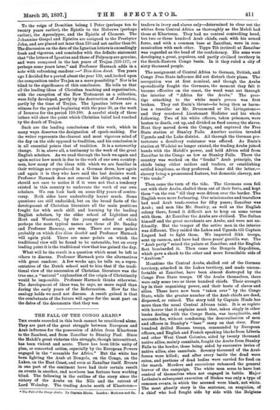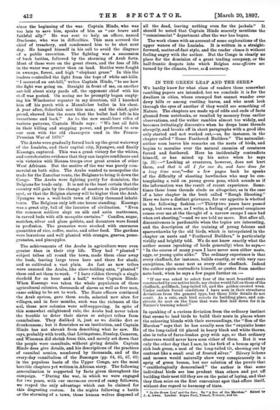THE FALL OF THE CONGO ARABS.*
THE events recorded in this book cannot be considered alone. They are part of the great struggle between European and Arab influence for the possession of Africa from Khartoum to the Zambesi, and from Zanzibar to Stanley Pool. Since the Mandi's great victories this struggle, though intermittent, has been violent and acute. There has been little unity of plan, or concerted action, especially by the European Powers engaged in the " scramble for Africa." But the white has been fighting the Arab at Dongola, on the Congo, on the Lakes, on the East Coast, and even at Zanzibar itself. Events in one part of the continent have had their certain result on events in another, and nowhere has fortune been working blind. The following is the outline of the story since the victory of the Arabs on the Nile and the retreat of Lord Wolseley. The trading Arabs south of Khartoum- • The Pallet the Congo Arabs. By Captain Hind,. London: Methuen and Co.
traders in ivory and slaves only—determined to clear out the whites from Central Africa as thoroughly as the Mandi had those at Khartoum. They had no central controlling hand, but two or three hundred Arab chiefs, each with his armed force, and with a common base at Zanzibar, were in com- munication with each other. Tippu Tib (retired) at Zanzibar was regarded as the head of the confederacy. His sons were developing a great, populous, and partly civilised territory in the South-Eastern Congo basin. In it they ruled a city of sixty thousand people.
The assignment of Central Africa to German, British, and Congo Free State influence did not disturb their plans. The occupation was at first nominal, and though the Arabs sporadically fought the Germans, the moment they felt it become effective on the coast, the word went out through the interior of " Africa for the Arabs." The pres- tige attaching to the white man's person was first broken. They cut Emin's throat—he being then as harm- less a traveller as Mr. Drummond or Dr. Livingstone— and they murdered Lieutenant Hodister and his whole following. Two of his white officers, taken prisoners, were beaten to death, cut up, and divided as food among the slaves. Next they moved down the Congo, and captured the Free State station at Stanley Falls. Another section invaded Uganda and the Lake district. All through the German pro- tectorate a desultory resistance was offered. As Emin's station at Wadelai no longer existed, the trading Arabs joined hands with the Mandi's power, and held Africa solid from Zanzibar to the Congo as low as Stanley Falls. There the country was worked on the " feudal " Arab principle, the chiefs being either raiders and traders, or establishing settled kingdoms, as they preferred. Some did the latter,— slavery being a pronounced feature, but domestic_ slavery, not " the trade."
Then came the turn of the tide. The Germans soon fell out with their Arabs, shelled them out of their forts, and kept them "on the run" till they were driven over the border. The English were more forbearing. Our missionaries and travellers had used Arab trade-routes for fifty years; Zanzibar was Arab ; and men like Mr. Stanley, as well as the English colony there, found it difficult not to keep on some terms with them. At Zanzibar the Arabs are civilised. The Sultan himself and the great merchants are Arabs, and were not un- friendly. But the temper of the active men in the interior was different. They raided the Lakes and Uganda till Captain Lugard had to fight them. We imported Sikh troops, sent up cannon, and have had three years' guerilla war. The "Arab party" seized the palace at Zanzibar, and the English fleet bombarded it. Then came the Dongola Expedition, which gave a shock to the other and more formidable side of " Arabi sm."
Meantime the Central Arabs, shelled out of the German territory, attacked in the Lakes territory, and made uncom- fortable at Zanzibar, have been almost destroyed by the Congo Free State troops. Of the Arabs themselves, there were only some two or three hundred chiefs. Their strength lay in their organising power, and their hosts of slaves and allies. These have now been " taken over " by the Congo State, while the greater number of the Arab chiefs are dead, dispersed, or ruined. The story told by Captain Hinde has more than the usual Central African taint. It is so replete with horror that it explains much that, taken singly in other books dealing with the Congo Basin, was inexplicable, and accounts for, without condoning, the demoralisation of men and officers in Stanley's " base " camp on that river. Four hundred drilled Houssa troops, commanded by European officers, and English and French speaking blacks from Liberia and other West Coast Colonies, aided by twenty thousand native pines, mainly cannibals, fought the Arabs from Stanley Falls to the border, these being aided by successive levies of native allies, also cannibals. Seventy thousand of the Arab forces were killed ; and after every battle the dead were eaten, and portions of dead bodies were carried for food on the march. Murders and executions enhanced the general horror of the campaign. The white men seem to have lost control of themselves when not engaged in battle. Major Lothaire's subsequent execution of Stokes was only a type of common events, in which the accused were black, not white. The most ghastly story is the sentence, on suspicion, of a chief who had fought side by side with the Belgians
since the beginning of the war. Captain Hinde, who was too late to save him, speaks of him as " our brave and faithful ally." He was sent to help an officer, named Duchesne, who was in difficulties. This man accused the chief of treachery, and condemned him to be shot next day. He hanged himself in his cell to avoid the disgrace of a public execution. The fighting was a succession of bush battles, followed by the storming of Arab forte. Most of these were on the great rivers, and the loss of life in the water was greater than on land. Battles were fought in swamps, forest, and high "elephant grass." In this the leaders controlled the fight from the tops of white ant-hills. " I mounted an ant-hill," writes Captain Hinde, " to see how the fight was going on. Straight in front of me, on another ant-hill about sixty yards off, the opponent chief with his staff was posted. On seeing me he promptly began empty- ing his Winchester repeater in my direction, till I knocked him off his perch with a Mannlicher bullet in his chest. A year after, Scherlink met this man; and the chief, quite proud, showed him the scars that the bullet had left in his breastbone and back." As to the new small-bore rifles of various patterns, Captain Hinde says : " We lost all faith in their killing and stopping power, and preferred to arm our men with the old chassepots used in the Franco- Prussian War of 1870."
The Arabs were gradually forced back up the great waterway of the Lualaba, and their capital city, Nyangwe, and finally Kasongo, captured. This was a great victory for the whites, and corroborative evidence that they can inspire confidence and win victories with Houssa troops over great armies of other West Africans. But the motive of the war was purely com- mercial on both sides. The Arabs wanted to monopolise the trade for the Zanzibar route, the Belgians to bring it down the Congo. The Arabs were fighting partly for dominion, the Belgians for trade only. It is not in the least certain that the country will gain by the change of masters in this particular spot, or that the Belgian slavery will be higher than the Arab. Nyangwe was a well-built town of thirty thousand inhabi- tants. The Belgians only left one house standing. Kasongo was a great city, full of the luxuries of civilisation. "Even the common soldiers slept on silk and satin mattresses, in carved beds with silk mosquito curtains." Candles, sugar, snatches, silver and glass goblets, and decanters were found in profusion. The granaries were stocked with enormous quantities of rice, coffee, maize, and other food. The gardens were luxurious and well planted with oranges, guavas, pome- granates, and pineapples.
The achievements of the Arabs in agriculture were even greater than in their city life. They had " planted " subject tribes all round the town, made them clear away the bush, leaving large trees here and there for shade, and so cultivated a vast plain. As fast as new tribes were annexed the Arabs, like slave-holding ants, "planted" them and set them to work. " I have ridden through a single ricefield for an hour and a half," writes Captain Hinde. When Kasongo was taken the whole population of these agricultural colonies, thousands of slaves as well as free men, came asking to be set to work. The State officers continued the Arab system, gave them seeds, selected new sites for villages, and in four months, such was the richness of the soil, these new colonies were self-supporting. In spite of this somewhat enlightened rule, the Arabs had never taken the trouble to deter their slaves or subject tribes from cannibalism. They disliked it just as we dislike dirt or drunkenness; but it flourishes as an institution, and Captain Hinde has not shrunk from describing what he saw. He says, probably with truth, that Livingstone, Stanley, Cameron, and Wissman did shrink from this, and merely set down that the people were cannibals, without giving details. Captain Hinde does give details, and his descriptions of the practices of cannibal armies, numbered by thousands, and of the every-day cannibalism of the Basongos (pp. 64, 65, 67, 68) in the populous basin of the Upper Congo, are the most horrible chapters yet written in African story. The following generalisation is supported by facts given throughout the campaign. "During the war, in which we were engaged for two years, with our enormous crowd of camp followers, we reaped the only advantage which can be claimed for this disgusting custom. In the nights following a battle or the storming of a town, these human wolves disposed of all the dead, leaving nothing even for the jackals." It should be noted that Captain Hinde scarcely mentions the " commissariat " department after the war has began.
The work closes with an account of some explorations of the upper waters of the Lualaba. It is written in a straight- forward, matter-of-fact style, and the reader closes it without feeling angry with the author. But the Congo is clearly no place for the dominion of a great trading company, or the half-frantic despots into which Belgian sous-oliciers are turned by the climate, fever, aid autocracy.







































 Previous page
Previous page